Balls Read online
Balls
by
Michael D. Britton
* * * *
Copyright 2012 by Michael D. Britton / Intelligent Life Books
I watched as Winston Chambliss, my business partner of two years, not only managed to negotiate a quick private currency exchange on the bustling street outside the classically-built Bologna train station, but do so in broken Italian while holding a raspberry gelato and keeping his impeccably pressed Armani Collezioni as dazzlingly clean and sharp as the day he bought it.
Which, by the way, was yesterday, in Rome.
That was right after he had tried, once again, to hook me up with a young, gorgeous black-haired Italian woman – this time right there at the upscale clothier.
“Winston,” I’d said, “for the millionth time, I’m engaged, dude. Who do you think’s been calling me every fifteen stinking minutes wondering what I’m doing now, and who I’m doing it with?”
“Look Matthew,” he’d said, “I know Gina’s kinda jealous – it doesn’t help that you had to leave her home for this trip - I just figure, if you have to put up with all that haranguing, you might as well make it worthwhile. Besides, you’re not married yet, and this may be your last chance to have some fun. Excuse me for trying to help out.”
I just glared at him and started to browse through the tie racks, until I did the math in my head and realized that a million lira was about seven hundred bucks more than I wanted to spend on a sliver of polka-dotted silk.
And I knew it would be useless to try and haggle. No matter where we went in Italy, one thing was constant – nobody spoke a lick of English. After spending some time in Germany and Switzerland, where everybody speaks English; and in France, where most people pretended to not speak English (but mostly could) - this complete lack of communicative ability was the greatest barrier to our goal here in Italy: to find a buyer for my late great uncle’s espresso machine company, Azzurri Incorporated.
We’d come to Europe from San Francisco to meet with some of Winston’s contacts – had a few show some mild interest in buying my odd inheritance, but no serious takers. When Winston suggested Italy, I scoffed. “Italians don’t want to buy some American espresso machine company,” I’d said. Out of options and in the neighborhood, I decided we had nothing to lose.
Outside the Bologna train station, Winston headed back over to me, where I sat on a stone bench facing the Piazza delle Medaglie d'Oro, after he’d managed to turn a few hundred of our dollars into a couple million lira (I just like saying that, it sounds like so much money). He’d also bought a pair of train tickets from the helpful Italian man – tickets that would take us to unlimited stops for one day. Since the man had reached the end of his journey, he was able to give them to us for a steal. However, we still hadn’t figured out if Giacomo Freizza, the somewhat eccentric investor we needed to meet, was at his Florence office or his Venice office, and we could never seem to reach him by phone.
“Let’s just go to Venice, and if he’s not there, we’ll try Florence,” I said.
As we turned to head into the Bologna station, two guys walked past us, lugging a large oblong object between them.
The item appeared to be some sort of lumpy, heavy thing that bowed toward the ground in the middle. It was wrapped in black plastic. A muddy shoe was sticking out of one end.
The men, dressed casually and both needing a shave, looked like the rugged athletic type.
Winston, always cocky, said in his Boston Brahmin accent (and much louder than I would’ve, but it hardly mattered since nobody spoke English), “Looks like they’ve got a dead body in there!”
It really did look that way.
To our shock, one of the men turned and replied, “Yeah, mate, it’s me mother.”
“Come on,” I whispered, “let’s follow those guys – find out what’s really going on.”
“Why?” asked Winston. “We have a job to do here.”
“Look,” I said, “You want me to have one last great adventure as a single guy, and this is it. Not the bimbos you keep trying to shove on me. This. A chance for a little intrigue. Come on – it’ll be fun. Fun that Gina would never go for.”
Winston reluctantly agreed and we followed them, keeping a safe distance.
The Bologna Central Station was much like the other train stations in Italy: big, full of people who seemed to be constantly fighting with one another, and full of echoes and apparent chaos. If you could take your eyes off the rambunctious crowd for two minutes, and look around, the mid-nineteenth century neoclassical architecture was really quite impressive with its marble floors and square dimensions throughout. The main clock seemed to be stuck at 10:25. Someone should get that fixed.
We spied on the “murderers” from near the stairwell that led to the platforms.
“Check it out,” I said. “They’re going to Florence. Let’s just go there first instead.”
“Okay, whatever. It’s kinda weird that they won’t put it down anywhere, huh? I mean, they won’t let that thing out of their sight,” said Winston.
“Of course not,” I said. “The body is evidence.”
“We still don’t know it’s a body.”
“Hmm. Looks like a body, and they say it’s a body. So far, everything points to it being a body. You know Sicily isn’t too far from here, right?”
“What’s that got to do with anything?” asked Winston.
“Hellooo?” I said. Then whispered, “The mob, dude.”
“What are you on, man?” said Winston.
“Look,” I said, “What’s the easiest way to hide something? In plain sight!”
Winston looked at me dubiously and led the way to the noisy platform, where we boarded the slick-looking train with its sloped nose and automatic doors, one car back from the killers.
“Wow, this is nice,” I said, looking at the plush seats and the softly gliding glass doors that separated the cars.
“Yeah,” said Winston, “these new high speed trains are pretty cool. You know they go so fast, they actually lean into the curves?”
The train began to accelerate, and within a few minutes we were out of the city, into the countryside, and the train was demonstrating the fast lean technique.
“Biglietti!” said the conductor, moving through the car and punching tickets. He stopped next to us. “Biglietti.”
“Oh, we don’t have any,” said Winston, thinking he was being cute.
“He’s just messing around,” I said. “Here.” I handed the mustachioed conductor our tickets.
He eyed them, then started babbling something in Italian. When we looked at him quizzically, he spoke slowly, in heavily-accented English, clearly impatient.
“Biglietti errato. Wrong ticketti. Non veloce – uh, not for fast train. Only for treno lento. Slow train. You musta get off next stop.”
And then he walked away.
“Nice going, Winston,” I said. “You got us ripped off.”
Luckily for us, the next stop was Florence.
And that’s where our friends got off, too.
Clutching their morbid burden.
“Come on,” I said.
We followed them out of the station, into a wall of heat and sunshine, tracing their steps in a southeast direction. For nearly a mile through the narrow city streets and walkways of Florence, these brazen ghouls toted that hefty carcass (no doubt avoiding taxis so they wouldn’t have to explain their “luggage”). By the time we finally reached the tiny Hotel Bernini on the Via Torta, overlooking the breathtaking Piazza di Santa Croce, the hot cobblestone streets were eerily deserted for the Italian version of siesta.
From the hotel entrance, we watched the killers check in and then squeeze into a tiny caged elevator with rattling manual doors. They carefully stood their load up in the
corner of the elevator, leaning bulkily against the wall.
“Now what, genius?” asked Winston.
My phone rang before I could come up with an answer.
“Gina,” I whispered, “I can’t talk now. No. No. Of course not. Yes, I’m with Winston. No, no we didn’t. No – look - I’ll have to call you back later.”
I hung up in the middle of her strident protestations.
“Let’s ask the clerk about those guys,” said Winston.
We stepped in and approached the desk. I pulled out my PDA, which had a “cool” translation program – just speak into it in English, and it repeats what you said in the language of your choice. I say “cool” because so far it had failed to work every time I tried it.
“Excuse me, can you please tell me who just checked in – we’re trying to uh, meet some friends.”
I released the record button and hit playback, Italian.
The clerk looked at me coldly for a moment, then burst out laughing.
Stupid PDA.
“You say you would like to inspect my insides, hoping to make a friend? Ha ha! Voi straniero ammalato!”
“You speak English? Thank the stars!” said Winston. “What my friend is trying to say is that we need to know who that was – who just went up the elevator.”
“Sono spiacente, non posso dirlo. Privacy law.”
“Slip him a few lira,” I whispered.
Winston pulled out his wallet. I was amazed that in this heat, in that suit, after walking through Florence on the trail of killers, the man was yet to break a sweat. And his hair was still perfect, his little gelled spikes jagged in all directions, perfectly arranged to look messy without actually being messy.
“Uh, Matthew,” he said, “we don’t have enough for a bribe here. Our friend back in Bologna not only scammed us on the tickets, but he short changed us big time on the currency exchange.”
I closed my eyes and exhaled. “Grazi,” I said to the clerk, and dragged Winston out by the arm.
“At least we still have the credit cards,” said Winston once outside. “They’re just not so handy for bribes.”
“Let’s just go find Mr. Freizza’s office,” I said, giving up on my little escapade. No more killers and body bags, just espresso companies and weddings for me.
I pulled up a Google map on my PDA and used the street view function to track our way across the piazza, down a side street, and over three blocks to where our contact might be found.
The city was starting to get lively now, the afternoon still hot but a breeze picking up as if to usher the slumbering people back to life from their daily siesta.
The office was locked. Nobody came when we knocked.
“Okay, he must be in Venice, then,” said Winston. “Let’s head out.”
Winston called for a taxi on his phone while I pondered the body bag men. I just couldn’t let go of this final adventure. Soon I’d be tied down, unable to pursue my whims without first obtaining permission, and not likely getting it. What were those men up to in that hotel room? Hacking up the remains into little pieces they could easily dispose of?
After a few minutes two taxis came by, and we climbed into one. Before we could pull away, there was a loud banging on the roof of the car that made us both jump out of our skins.
The driver of the other taxi was slamming down on our car and yelling frantically in Italian.
Our driver stopped, got out, and ranted back at the other driver. They yelled at each other for about two minutes, their hands flying about wildly. I figured it was going to come to fisticuffs, when they finally smiled, shook hands and patted each other on the back. Our driver returned, and we pulled out across the street and flipped a U-turn.
“What was that all about?” I asked.
“Ah – you call him, but I pick you up. He think I steal his, uh, his work. I tell him he can take the other two stranieri from the Hotel Bernini. We work it out, eh?”
The other two foreigners. The hotel. “You hear that, Winston? They’re already on the move.”
“Uh, escusa,” said Winston, “do you know where the other stranieri are going?”
“Venezia.”
“Ah,” I said. “That’s where we’re going, too.”

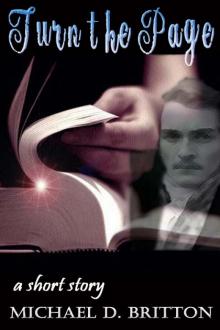 Turn the Page
Turn the Page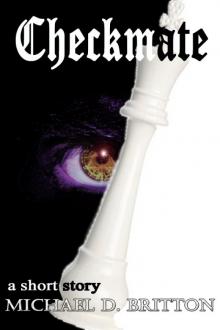 Checkmate
Checkmate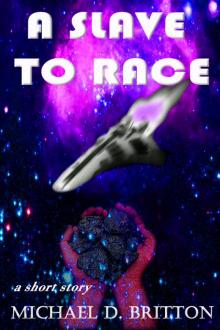 A Slave to Race
A Slave to Race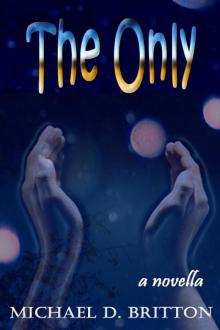 The Only
The Only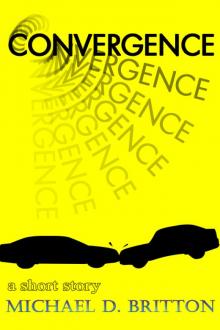 Convergence
Convergence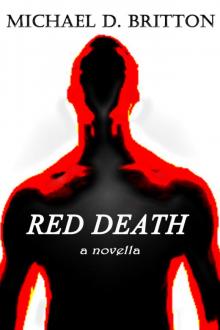 Red Death
Red Death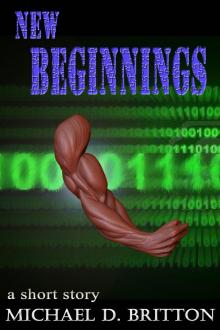 New Beginnings
New Beginnings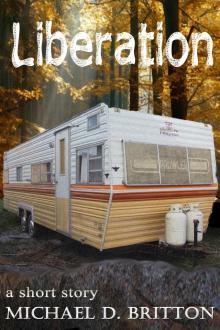 Liberation
Liberation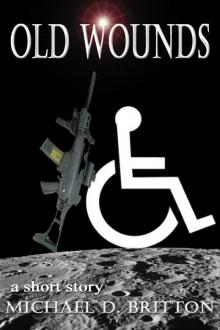 Old Wounds
Old Wounds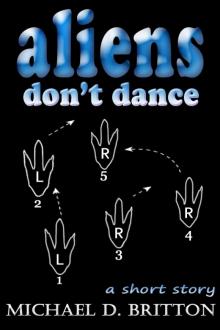 Aliens Don't Dance
Aliens Don't Dance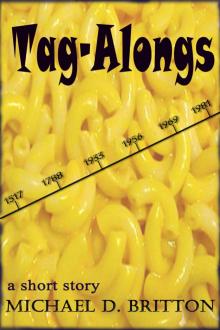 Tag-Alongs
Tag-Alongs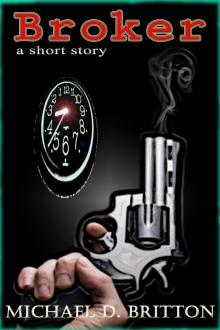 Broker
Broker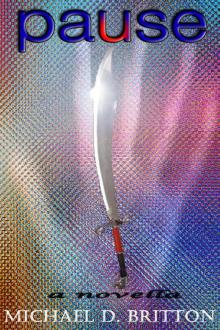 Pause
Pause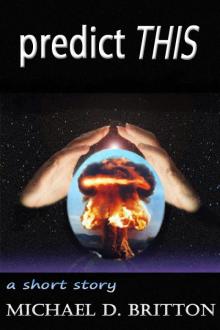 Predict THIS
Predict THIS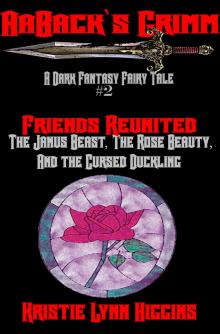 AaBack's Grimm: Dark Fantasy Fairy Tale #2 Friends Reunited: The Janus Beast, The Rose Beauty, And The Cursed Duckling
AaBack's Grimm: Dark Fantasy Fairy Tale #2 Friends Reunited: The Janus Beast, The Rose Beauty, And The Cursed Duckling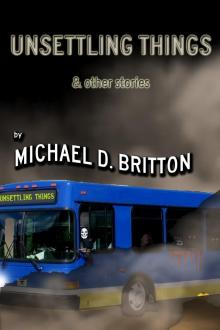 Unsettling Things & Other Stories
Unsettling Things & Other Stories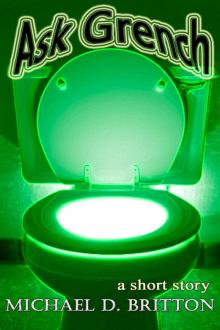 Ask Grench
Ask Grench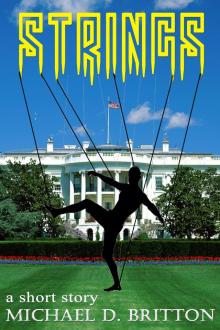 Strings
Strings Going to the Dogs
Going to the Dogs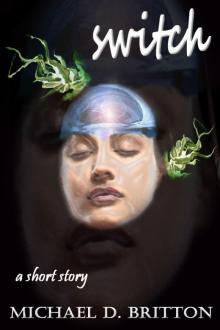 Switch
Switch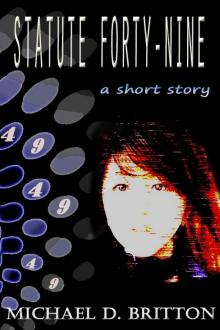 Statute Forty-Nine
Statute Forty-Nine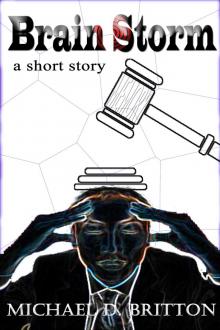 Brain Storm
Brain Storm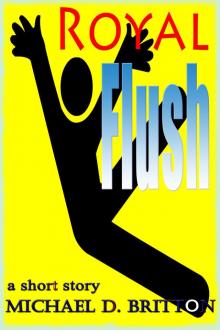 Royal Flush
Royal Flush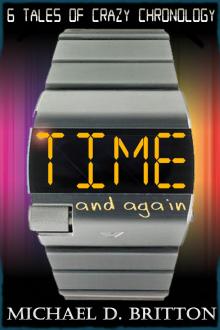 Time and Again: A Collection of Crazy Chronology
Time and Again: A Collection of Crazy Chronology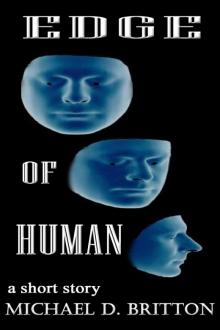 Edge of Human
Edge of Human A Sense of Souls
A Sense of Souls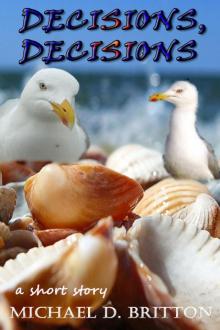 Decisions, Decisions
Decisions, Decisions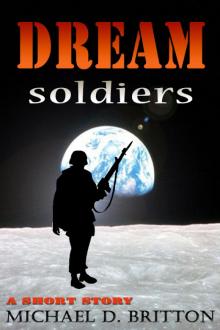 Dream Soldiers
Dream Soldiers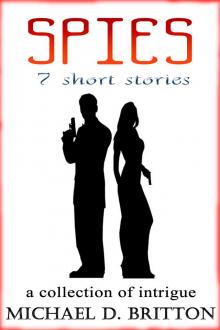 Spies: 7 Short Stories
Spies: 7 Short Stories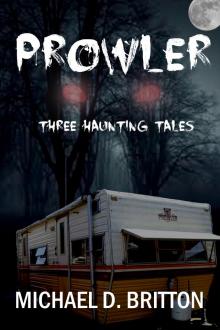 Prowler: Three Haunting Tales
Prowler: Three Haunting Tales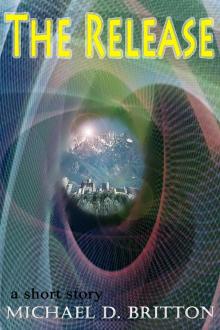 The Release
The Release Lunar Tales - an anthology
Lunar Tales - an anthology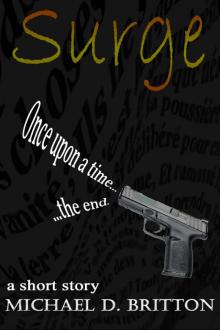 Surge
Surge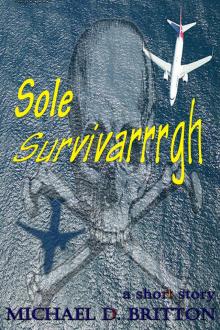 Sole Survivarrrgh
Sole Survivarrrgh Remember
Remember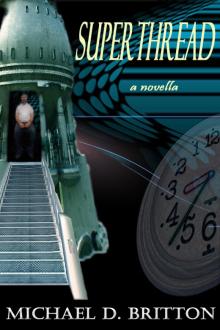 Superthread
Superthread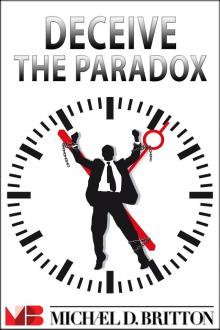 Deceive the Paradox
Deceive the Paradox Project: Dreamer
Project: Dreamer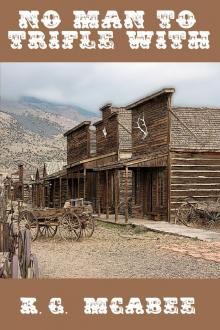 No Man to Trifle With
No Man to Trifle With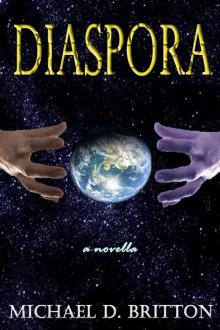 Diaspora
Diaspora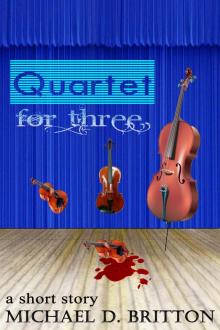 Quartet for Three
Quartet for Three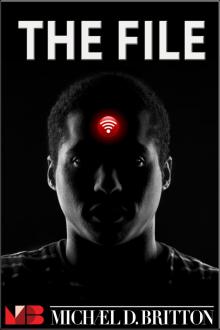 The File
The File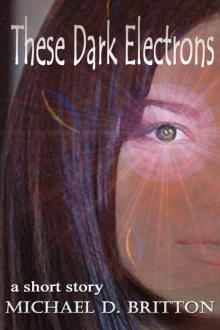 These Dark Electrons
These Dark Electrons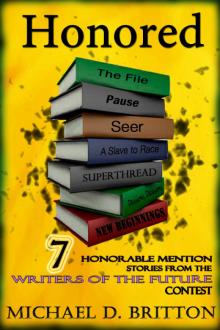 Honored: 7 Honorable Mention Stories from the Writers of the Future Contest
Honored: 7 Honorable Mention Stories from the Writers of the Future Contest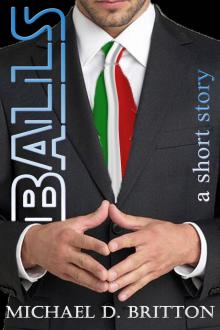 Balls
Balls The Final Testament
The Final Testament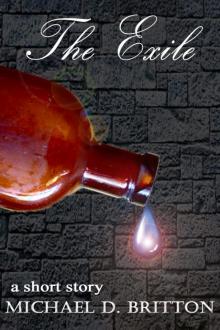 The Exile
The Exile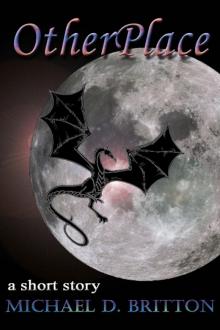 OtherPlace
OtherPlace